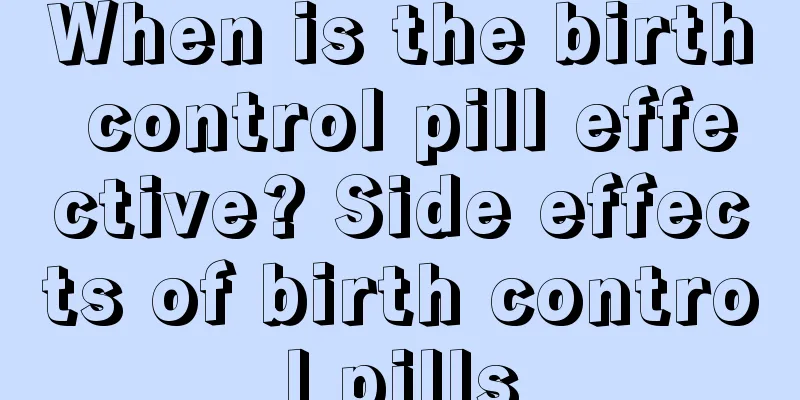When is the birth control pill effective? Side effects of birth control pills

|
As society becomes more and more open, young men and women are more bold in opening themselves up, and sex has become very common. In the meantime, it is necessary to do emergency contraception. If safety measures are not taken during sex, then it must be made up afterwards. Emergency contraceptive pills have become the first choice for many people. Therefore, when is the most effective time to take contraceptive pills? What are the side effects of contraceptive pills? When is the contraceptive pill effective?Taking birth control pills after intercourse is a short-acting method of contraception. The harm it brings to women's bodies varies depending on individual differences. It is effective if taken within 72 hours after intercourse. Of course, the shorter the time of taking the contraceptive, the better the effect. Women who take emergency contraceptives after sex must remember not to eat or drink within 4 hours to avoid excessive secretion of digestive enzymes that may affect the efficacy of the drug and lead to contraceptive failure. In addition, taking contraceptives for the second time within the same physiological cycle will not achieve the contraceptive effect. After taking emergency contraceptives, women will experience irregular vaginal bleeding once a week or so. This is a normal phenomenon and you don’t need to worry too much. Bleeding indicates that the drug has taken effect and caused withdrawal bleeding. However, some women will not experience this phenomenon. Is it useful to take birth control pills in advance?There is no need to take it in advance. Emergency contraceptive pills are effective within 72 hours after sexual intercourse. If you have sex again while taking the pills, the time needs to be recalculated. It should be used within 72-120 hours after sexual intercourse. The earlier you take it, the better the effect. If it is taken more than 72 hours, the failure rate is often higher. Suggestions: The contraceptive rate of emergency contraceptive pills is not 100%. If you have delayed your period after taking emergency contraceptive pills, you should go to the hospital for a pregnancy test to determine whether the emergency contraception has failed. Emergency contraceptive pills are not a conventional contraceptive method. It is recommended not to take them frequently, once a menstrual cycle, and no more than three times a year. Frequent use of emergency contraceptive pills can cause menstrual disorders, and in severe cases, affect pregnancy. For safety reasons, it is recommended to use a safe and effective contraceptive method. Note: The success rate of emergency contraceptive pills is only 80%, so the editor recommends that you use condoms or oral long-term contraceptives, which are less harmful to the body and more convenient. Remember: because contraceptive pills contain hormones, they will affect endocrine. In other words, contraceptive pills are contraceptives that change the menstrual period. Basically, menstruation will come soon after taking the pills. The reason why it is not recommended to take more than twice a month and no more than three times a year is that contraceptive pills change the menstrual period and are very bad for women's health. And women need 2-3 months to regulate. Bleeding after taking emergency contraceptive pills is a common situation, which is clinically called withdrawal bleeding. In fact, this kind of bleeding is generally not considered as menstruation. Several situations of bleeding after taking emergency contraceptive pills: Women of childbearing age take emergency contraceptive pills at different times of the menstrual cycle, and the effect on menstruation will also be different. If it is taken in the first half of the menstrual cycle, it may interfere with women's menstruation and vaginal bleeding may occur; if it is taken in the second half of the menstrual cycle, it will interfere with women's menstruation less. If the amount of bleeding is similar to the usual menstrual volume, it can be regarded as a menstrual period. What are the side effects of birth control pills?We may not be very clear about this. Gynecologists say that emergency contraceptive pills are generally used within 72 hours after normal contraceptive methods fail. Since the use of emergency contraceptive pills is not restricted by the menstrual cycle, some women who want convenience use them as regular contraceptive methods. However, commonly used emergency contraceptive pills can easily cause endocrine disorders, irreversible effects on the ovaries, and even cause the ovaries to "age" prematurely, with estrogen secretion becoming less and less or even disappearing suddenly. So, what are the side effects of emergency contraceptive pills? Xiaobian will explain it to you in detail: TideMost women have their periods on time, but some women have their periods early or late. If your period is delayed by 1 week, you should do a urine pregnancy test to determine if the emergency contraceptive pill has failed. nauseaDifferent emergency contraceptive pills have different incidence rates, with mifepristone having the lowest incidence rate of 6% to 7%. Nausea usually lasts no more than 24 hours. VomitThe incidence of nausea and vomiting varies with different emergency contraceptive pills, with levonorgestrel at about 5% and mifepristone at about 1%. It is generally believed that taking emergency contraceptive pills with food or before going to bed can reduce the incidence of nausea and vomiting, but there is no definite clinical data. BleedingSome women may experience vaginal spotting after taking emergency contraceptive pills, which generally does not require treatment. otherWhat are the side effects of emergency contraceptive pills? In addition to the more specific side effects mentioned above, it may also cause breast tenderness, headache, dizziness, fatigue, etc. These symptoms are generally mild and last no more than 24 hours. Severe breast tenderness and headache can be treated with aspirin or other painkillers. "No. 5 Parenting" (:yuer5h) |
<<: How much does it cost to have an IUD inserted? What is the best time to remove the IUD?
Recommend
How to improve parent-child relationships and promote contact, what are the activity techniques
Creating a good parent-child relationship can hel...
How to bathe your baby correctly? What is the water temperature for bathing your baby?
Giving your baby a bath is a difficult and arduou...
Do you need to rinse Colgate mouthwash with water after use? How many times a day should you use Colgate mouthwash?
It is said that using mouthwash can freshen breat...
Can children take calcium tablets when their teeth are changing? What are good things for children to eat when their teeth are changing?
During the period of children's teeth replace...
Is it better for children to change their teeth early or late? Is it better for children to change their teeth early?
Tooth replacement is a sign of a child's grow...
What is a humidifier used for? What is the principle of a humidifier?
Everyone should be familiar with humidifiers, bec...
Is it okay to shave the baby's head when the baby is one month old? It is not feasible to shave the baby'
The older generation says that the baby's hai...
6-month-old baby development indicators 6-month-old baby development standards
When the baby is six months old, his body has gro...
How to take care of diaper dermatitis How to take care of diaper dermatitis
The baby's skin is very delicate. If it is no...
7 common reasons why babies cry. Tips to stop crying in 1 second
A newborn baby is an angel on one side and a devi...
How much is 60 pieces of Pigeon mosquito repellent patch? Price of 60 pieces of Pigeon mosquito repellent patch
The specifications of Pigeon Mosquito Repellent P...
Can a newborn baby take a bath when he or she has a cold? What are the benefits of taking a bath for a newborn baby?
Newborns are very susceptible to infection from e...
What should I do if my baby has dry stools and can't pass them out? What should I do if my baby has dry stools?
Dry stool is a common symptom in babies. Babies w...
How to discover children's interests and hobbies How to cultivate children's interests and hobbies
When my child was young, I always wanted to culti...
What should I do if the pregnant woman has not given birth yet?
If the due date has passed but the baby hasn'...









